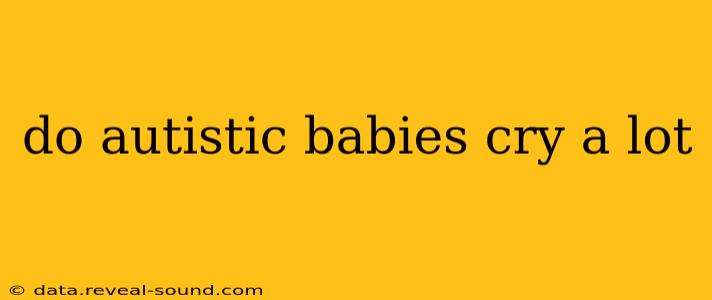Do Autistic Babies Cry a Lot? Understanding Infant Crying and Autism
Many parents wonder about the link between crying in infancy and later diagnosis of autism spectrum disorder (ASD). While there's no definitive answer to whether autistic babies cry more than neurotypical babies, the way they cry and their overall sensory responses can offer clues. It's crucial to understand that crying is a normal part of infant development, regardless of neurodevelopmental differences. However, certain patterns might warrant attention from healthcare professionals.
What are some common crying patterns in infants?
Infants cry for various reasons: hunger, discomfort, tiredness, and needing a change of diaper are common culprits. However, the intensity, duration, and type of cry can vary. Some babies are naturally fussier than others, and this doesn't automatically indicate autism.
Do autistic babies have different crying patterns?
Some research suggests that infants later diagnosed with autism may exhibit different crying patterns than their neurotypical peers. This might manifest as:
- Higher-pitched cries: While not always the case, some studies have noted a tendency towards higher-pitched cries in infants who are later diagnosed with ASD.
- Less variation in cry: The cries might lack the typical variations in tone and intensity seen in neurotypical babies. This could potentially indicate difficulties with emotional regulation, a characteristic sometimes associated with autism.
- Difficulty soothing: Autistic infants might be harder to soothe, possibly due to heightened sensory sensitivities. Certain sounds, textures, or lights might be particularly overwhelming.
It’s vital to remember that these are potential indicators, not definitive diagnostic criteria. Many neurotypical babies also exhibit these characteristics from time to time.
Is excessive crying a symptom of autism?
Excessive crying itself isn't a diagnostic symptom of autism. Autism is diagnosed through a comprehensive assessment considering various developmental milestones, behaviors, and interactions. A baby’s crying pattern, while potentially suggestive, is only one small piece of the puzzle.
How can I tell if my baby's crying is cause for concern?
If you are concerned about your baby's crying patterns or overall development, consult with your pediatrician or a developmental specialist. They can assess your baby's development comprehensively and address your concerns. Early intervention is key when it comes to supporting children with developmental differences.
What other behaviors might indicate autism in babies?
Beyond crying patterns, other potential early indicators of autism in babies can include:
- Reduced eye contact: A lack of engagement in reciprocal gaze or minimal eye contact.
- Limited social responsiveness: Decreased interest in social interaction or less engagement with caregivers.
- Delayed language development: Slower than average progress in acquiring language skills, such as babbling or pointing.
- Repetitive movements: Engaging in repetitive actions or movements such as hand flapping or rocking.
- Sensory sensitivities: Showing unusual reactions to certain sounds, textures, lights, or smells.
Remember that the presence of one or even a few of these indicators doesn't necessarily mean your child has autism. However, they warrant professional observation and assessment.
When should I seek professional help for my baby's crying?
You should seek professional help if you observe persistent excessive crying, unusual crying patterns combined with other developmental concerns, or if you have any anxieties or concerns about your baby's overall well-being. Early intervention is crucial and can significantly benefit your child's development. Don't hesitate to reach out to your pediatrician or a specialist to get professional advice. Your pediatrician is the best resource to guide you and direct you to any necessary specialist consultations.
Disclaimer: This information is for general knowledge and educational purposes only and does not constitute medical advice. Always consult with a qualified healthcare professional for any concerns regarding your child's health and development.
